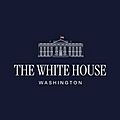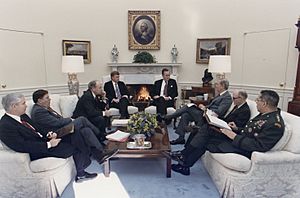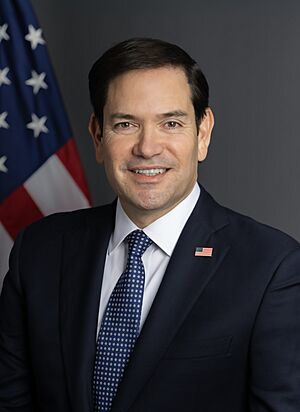National Security Advisor (United States) facts for kids
Quick facts for kids Assistant to the President for National Security Affairs |
|
|---|---|
 |
|
| Executive Office of the President | |
| Member of | National Security Council Homeland Security Council |
| Reports to | |
| Appointer | President of the United States |
| Constituting instrument | National Security Presidential Memorandum |
| Formation | 1953 |
| First holder | Robert Cutler |
| Deputy | Deputy National Security Advisor |
The Assistant to the President for National Security Affairs (often called the National Security Advisor or NSA) is a very important helper to the President of the United States. This person works in the Executive Office of the President at the West Wing of the White House.
The National Security Advisor's main job is to give advice to the President on all matters related to national security. This means keeping the country safe from threats both inside and outside. The advisor attends important meetings with the National Security Council (NSC). They often lead meetings with other top officials like the Secretary of State and Secretary of Defense. The NSA also helps with the Homeland Security Council (HSC). A team of staff helps the advisor by doing research and preparing important information for the President.
The President chooses the National Security Advisor. This person does not need to be approved by the United States Senate. However, if a high-ranking general is chosen, the Senate must approve them to keep their military rank. Currently, Marco Rubio has been the acting National Security Advisor since May 1, 2025.
Contents
What Does the National Security Advisor Do?
The job of the National Security Advisor can change a lot. It depends on who is in the role and how the President likes to work. Ideally, the advisor helps the President by giving fair advice on different choices for national security. They are not supposed to push their own ideas too much.
The National Security Advisor is a staff member who works directly for the President. They do not control the budgets or operations of big departments like the State Department or the Defense Department. The Secretary of State and Secretary of Defense are different because they are approved by the Senate and lead their own departments. The National Security Advisor can give daily advice to the President. This is helpful because they are close to the President and can offer ideas without being tied to the interests of large government groups.
During a crisis, the National Security Advisor often works from special rooms in the White House. These include the White House Situation Room or the Presidental Emergency Operations Center. For example, on September 11, 2001, the advisor kept the President updated on the fast-changing events.
History of the National Security Advisor Role

The National Security Council was created in 1947. This happened at the start of the Cold War. Its purpose was to help coordinate defense, foreign policy, and intelligence. This was part of a big change that also created the Department of Defense and the Central Intelligence Agency. The law did not create the National Security Advisor job directly. Instead, it created an executive secretary to lead the staff. In 1949, the NSC became part of the President's main office.
Robert Cutler was the first National Security Advisor in 1953. He held the job twice during President Eisenhower's time. The way the job works has stayed mostly the same since then. Especially since President John Kennedy, National Security Advisors have been very powerful. They have strong teams, even though formal NSC meetings might not be as important. This continues even when new presidents choose their own advisors and staff.
President Richard Nixon's National Security Advisor, Henry Kissinger, made the role even more important. He controlled what information reached the President. He also met with the President many times each day. Kissinger was also unique because he served as both National Security Advisor and Secretary of State at the same time for a period. He held the record for serving the longest, for 2,478 days. Michael Flynn holds the record for serving the shortest time, at only 24 days.
Brent Scowcroft held the job for two different presidents. He worked for the Ford administration and the George H. W. Bush administration.
List of National Security Advisors
Democratic Republican Independent
| This color means the person was acting in the role temporarily. |
| No. | Image | Name | Start Date | End Date | Time in Office | Notes | President | ||
|---|---|---|---|---|---|---|---|---|---|
| 1 |  |
Robert Cutler | March 23, 1953 | April 2, 1955 | 2 years, 10 days | Dwight D. Eisenhower (1953–1961) |
|||
| 2 |  |
Dillon Anderson | April 2, 1955 | September 1, 1956 | 1 year, 152 days | ||||
| – |  |
William Jackson Acting |
September 1, 1956 | January 7, 1957 | 128 days | ||||
| 3 |  |
Robert Cutler | January 7, 1957 | June 24, 1958 | 1 year, 168 days | ||||
| 4 |  |
Gordon Gray | June 24, 1958 | January 13, 1961 | 2 years, 203 days | ||||
| 5 |  |
Mac Bundy | January 20, 1961 | February 28, 1966 | 5 years, 39 days | John F. Kennedy (1961–1963) |
|||
| Lyndon B. Johnson (1963–1969) |
|||||||||
| 6 |  |
Walt Rostow | April 1, 1966 | January 20, 1969 | 2 years, 294 days | ||||
| 7 |  |
Henry Kissinger | January 20, 1969 | November 3, 1975 | 6 years, 287 days | Richard Nixon (1969–1974) |
|||
| Gerald Ford (1974–1977) |
|||||||||
| 8 |  |
Brent Scowcroft | November 3, 1975 | January 20, 1977 | 1 year, 78 days | ||||
| 9 |  |
Zbig Brzezinski | January 20, 1977 | January 20, 1981 | 4 years, 0 days | Jimmy Carter (1977–1981) |
|||
| 10 |  |
Richard Allen | January 21, 1981 | January 4, 1982 | 348 days | Ronald Reagan (1981–1989) |
|||
| – |  |
James Nance Acting |
November 30, 1981 | January 4, 1982 | 35 days | ||||
| 11 |  |
William Clark | January 4, 1982 | October 17, 1983 | 1 year, 286 days | ||||
| 12 |  |
Bud McFarlane | October 17, 1983 | December 4, 1985 | 2 years, 48 days | ||||
| 13 |  |
John Poindexter | December 4, 1985 | November 25, 1986 | 356 days | ||||
| – |  |
Alton Keel Acting |
November 26, 1986 | December 31, 1986 | 35 days | ||||
| 14 |  |
Frank Carlucci | January 1, 1987 | November 23, 1987 | 326 days | ||||
| 15 |  |
Colin Powell | November 23, 1987 | January 20, 1989 | 1 year, 58 days | ||||
| 16 |  |
Brent Scowcroft | January 20, 1989 | January 20, 1993 | 4 years, 0 days | George H. W. Bush (1989–1993) |
|||
| 17 |  |
Tony Lake | January 20, 1993 | March 14, 1997 | 4 years, 53 days | Bill Clinton (1993–2001) |
|||
| 18 |  |
Sandy Berger | March 14, 1997 | January 20, 2001 | 3 years, 312 days | ||||
| 19 |  |
Condoleezza Rice | January 20, 2001 | January 25, 2005 | 4 years, 5 days | George W. Bush (2001–2009) |
|||
| 20 |  |
Stephen Hadley | January 26, 2005 | January 20, 2009 | 3 years, 360 days | ||||
| 21 |  |
James Jones | January 20, 2009 | October 8, 2010 | 1 year, 261 days | Barack Obama (2009–2017) |
|||
| 22 |  |
Tom Donilon | October 8, 2010 | July 1, 2013 | 2 years, 266 days | ||||
| 23 |  |
Susan Rice | July 1, 2013 | January 20, 2017 | 3 years, 203 days | ||||
| 24 |  |
Michael Flynn | January 20, 2017 | February 13, 2017 | 24 days | Donald Trump (2017–2021) |
|||
| – |  |
Keith Kellogg Acting |
February 13, 2017 | February 20, 2017 | 7 days | ||||
| 25 |  |
H. R. McMaster | February 20, 2017 | April 9, 2018 | 1 year, 48 days | ||||
| 26 |  |
John Bolton | April 9, 2018 | September 10, 2019 | 1 year, 154 days | ||||
| – |  |
Charlie Kupperman Acting |
September 10, 2019 | September 18, 2019 | 8 days | ||||
| 27 |  |
Robert O'Brien | September 18, 2019 | January 20, 2021 | 1 year, 124 days | ||||
| 28 |  |
Jake Sullivan | January 20, 2021 | January 20, 2025 | 4 years, 0 days | Joe Biden (2021–2025) |
|||
| 29 |  |
Mike Waltz | January 20, 2025 | May 1, 2025 | 101 days | Donald Trump (2025–present) |
|||
| – |  |
Marco Rubio Acting |
May 1, 2025 | Incumbent | 297 days | ||||
Related Roles
- White House Chief of Staff
- Homeland Security Council
- Homeland Security Advisor
See also
 In Spanish: Consejero de Seguridad Nacional (Estados Unidos) para niños
In Spanish: Consejero de Seguridad Nacional (Estados Unidos) para niños
 | Stephanie Wilson |
 | Charles Bolden |
 | Ronald McNair |
 | Frederick D. Gregory |


